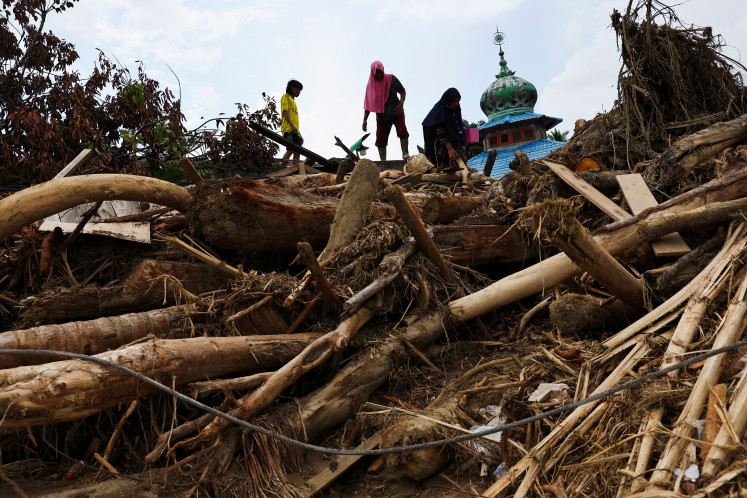Popular Reads
Top Results
Can't find what you're looking for?
View all search resultsPopular Reads
Top Results
Can't find what you're looking for?
View all search resultsRobust health care is 'new normal' for Indonesia
An epidemic curve shows the progression of illness in an outbreak over time. Epidemic curves show when people become ill by day, week or month. While scientists around the globe are trying to understand the virus and how to trace the most accurate epidemic curve, testing is fundamental to achieving the task.
Change text size
Gift Premium Articles
to Anyone
A
s we continue to understand and devise solutions to COVID-19, the “new normal” concept has become the single most discussed term by the public. We are seeing reports of several governments having successfully overcome the spread of the virus in their nations, showing how preparedness, coordination and discipline among citizens are the key elements in battling the pandemic.
An epidemic curve shows the progression of illness in an outbreak over time. Epidemic curves show when people become ill by day, week or month. While scientists around the globe are trying to understand the virus and how to trace the most accurate epidemic curve, testing is fundamental to achieving the task.
No one wants to contract the virus, see significant others suffering from the disease or, worse, cope with the deaths of loved ones. Everyone would love to see fewer and, if possible, zero new cases.
A leader of a great nation has recently said that testing for the virus is a double-edged sword because it leads to the identification of more cases. But fewer tests are not an option, as this will only make things more complicated.
On the other side of the globe, an archipelagic nation called Indonesia has been driven by eagerness to resume economic activity with, unfortunately, limited knowledge about how severe the pandemic’s impact is. Indonesia does not have a clear picture of the epidemic curve.
An accurate curve is required to decide priorities for the nation to rebound from the COVID-19 pandemic.
Everyone is anxious to go back to their normal lives and go about their daily business. Recently, Indonesia topped the list of reported cases in Southeast Asia, and this reported number is just the tip of the iceberg.
What we know now is that the virus originated in Wuhan, China, and spread throughout the world with human beings as carriers. The first confirmed cases in Indonesia were reported on March 2, while the first reported case in Taiwan was on Jan. 1. Both Indonesia and Taiwan have direct flights to and from Wuhan.
The question is, why was there a two-month lag between the first reported cases between both countries? This is a clear indication that the number of confirmed cases in Indonesia does not provide a clear picture of the real COVID-19 situation.
The prevalence of COVID-19 can be determined by serologic (antibody) tests, commonly known as “rapid tests”. Polymerase chain reaction (PCR) tests cannot determine this. The rapid tests, of course, should be done properly, with the right methodology and the right samples. The data can then be extrapolated to establish the prevalence of the virus and draw an accurate epidemic curve.
Moreover, as we venture into the new normal with the relaxation of large-scale social restrictions (PSBB), we should also look at the unsolved health care issues of the “old normal”. All necessary improvements and solutions to lingering problems should still be carried out properly so that the old normal does not haunt us or become a time bomb difficult to diffuse.
Indonesia’s national health insurance scheme (JKN) is one of the world’s most ambitious and largest single-payer programs. Launched in January 2014, JKN covered 221 million people, or 83 percent of the country’s population, by May 2019. The government is committed to maintaining JKN’s sustainability and ensuring a positive impact on health outcomes, financial protection, health equity and the health market and economy in general. However, the scheme’s annual financial deficits have increased, and its stability is in dire need of more attention. The COVID-19 pandemic has definitely added more stress to Indonesia's health care system.
The Indonesia Public Health Experts Association (IAKMI) has presented its projections of the virus’ potential impact on the economy, and all the scenarios show that the budget for mitigating the pandemic will skyrocket, matching the health budget for 2020.
American writer Maya Angelou wrote, “Hope for the best, but be prepared for the worst.” The worst-case scenario would be the number of cases going through the roof while, at the same time, the economy collapsed. The government’s decision to relax the partial lockdown will surely be seen as a breath of fresh air, as many hope that the economy will rebound as swiftly as possible.
But hope is not a strategy. We do not have an accurate epidemic curve.
Vice President Ma’ruf Amin mentioned that small and medium businesses were the ones who had received the hardest blow from the pandemic. It would not be an overstatement to say that the people in this sector are also the ones who are benefiting from universal health care coverage. Therefore, making sure that Indonesia has a robust health care system – addressing the issues in the “old normal” – is what will make sure that we can resume activity and continue strengthening the country in the “new normal” era.
The time is now for all sectors to work creatively, collaboratively, efficiently and effectively to address all issues. Creative minds should not feel discouraged in proposing and trying out their ideas.
Regulators should keep an open mind about innovation, efficiently facilitating proposed solutions to make sure that they are effective.
-------------------
Senior lecturer in epidemiology, statistics, and research methods at the University of Derby, UK, and member of the Indonesian Public Health Association (PP IAKMI)










